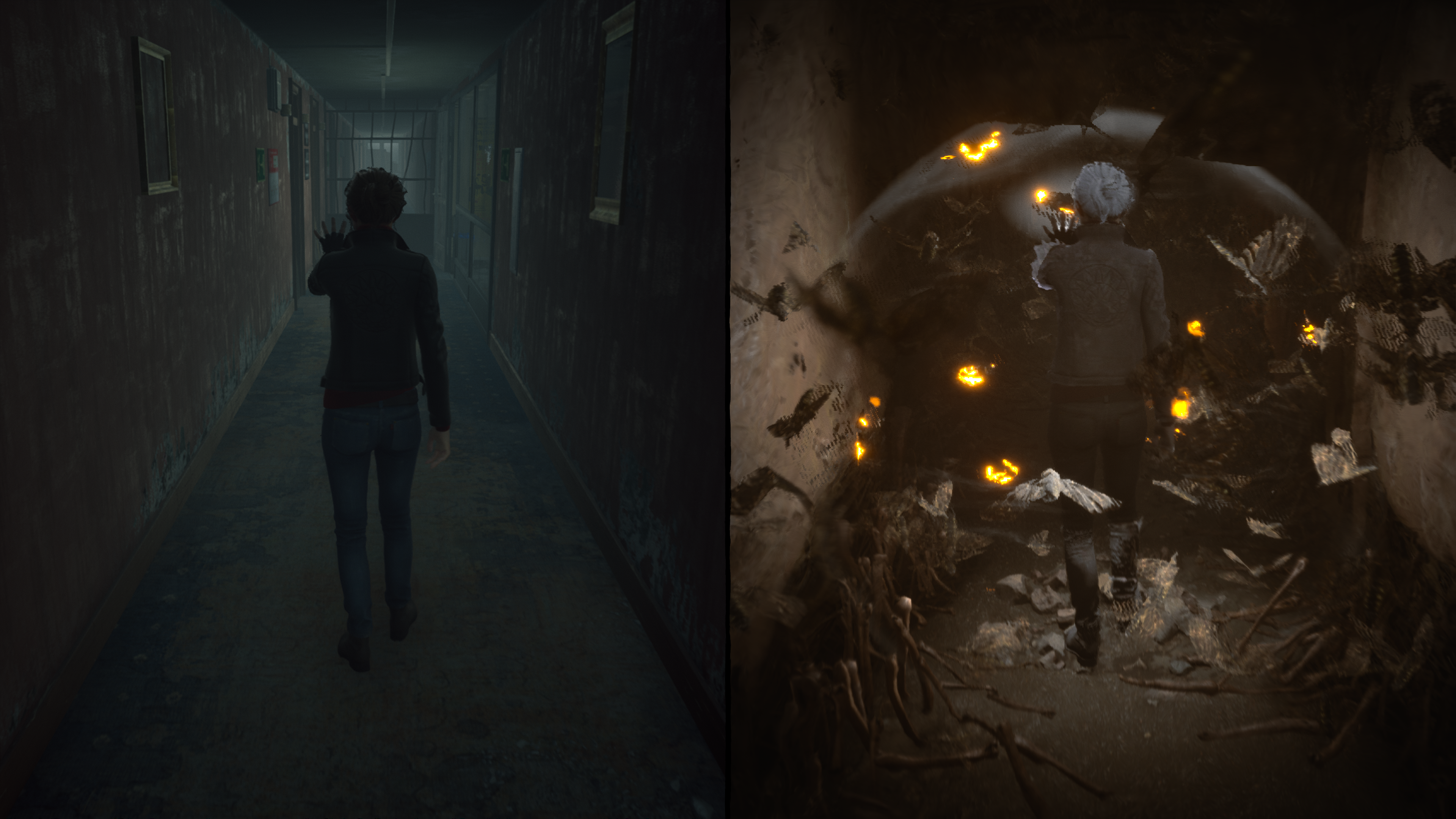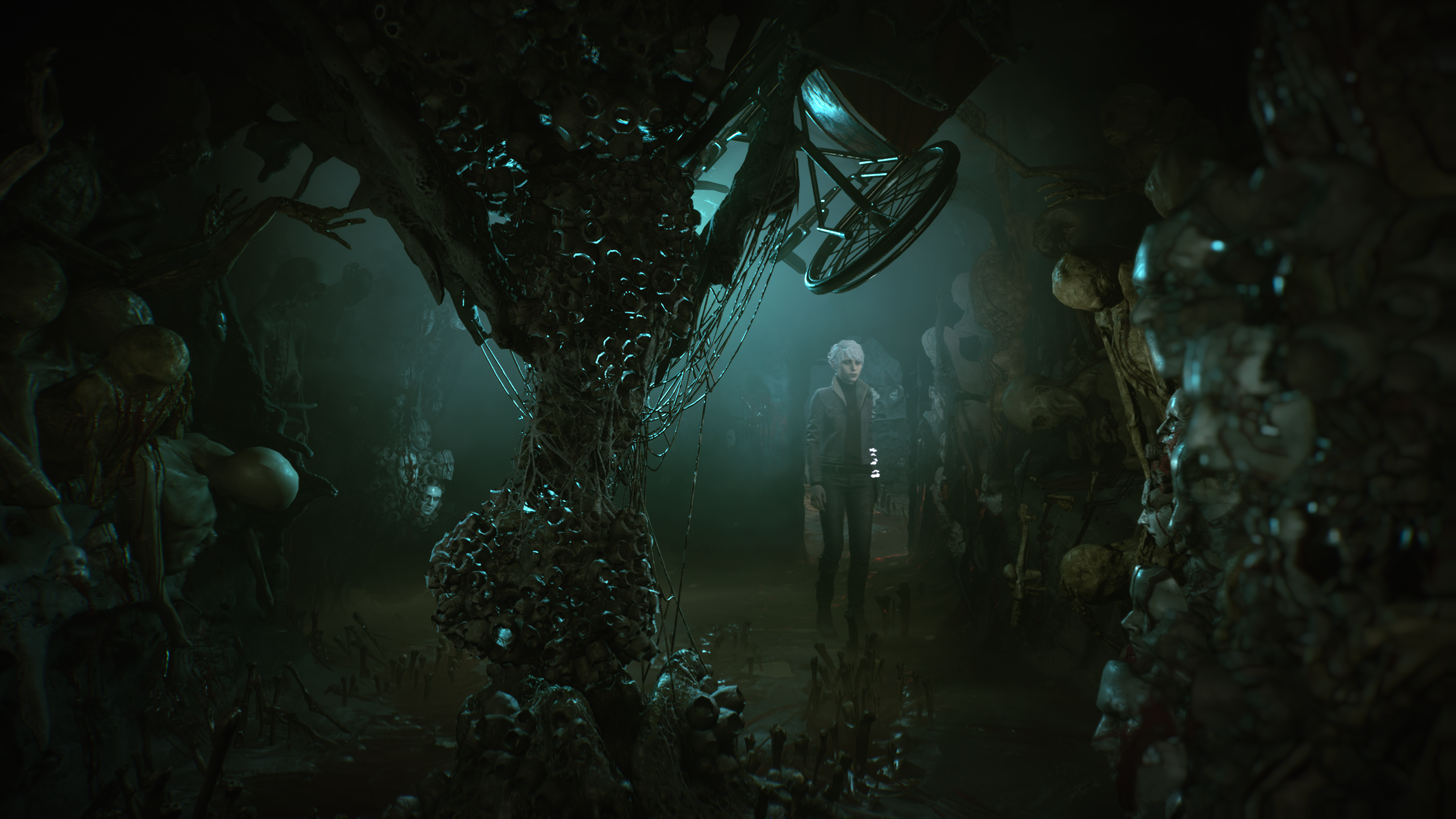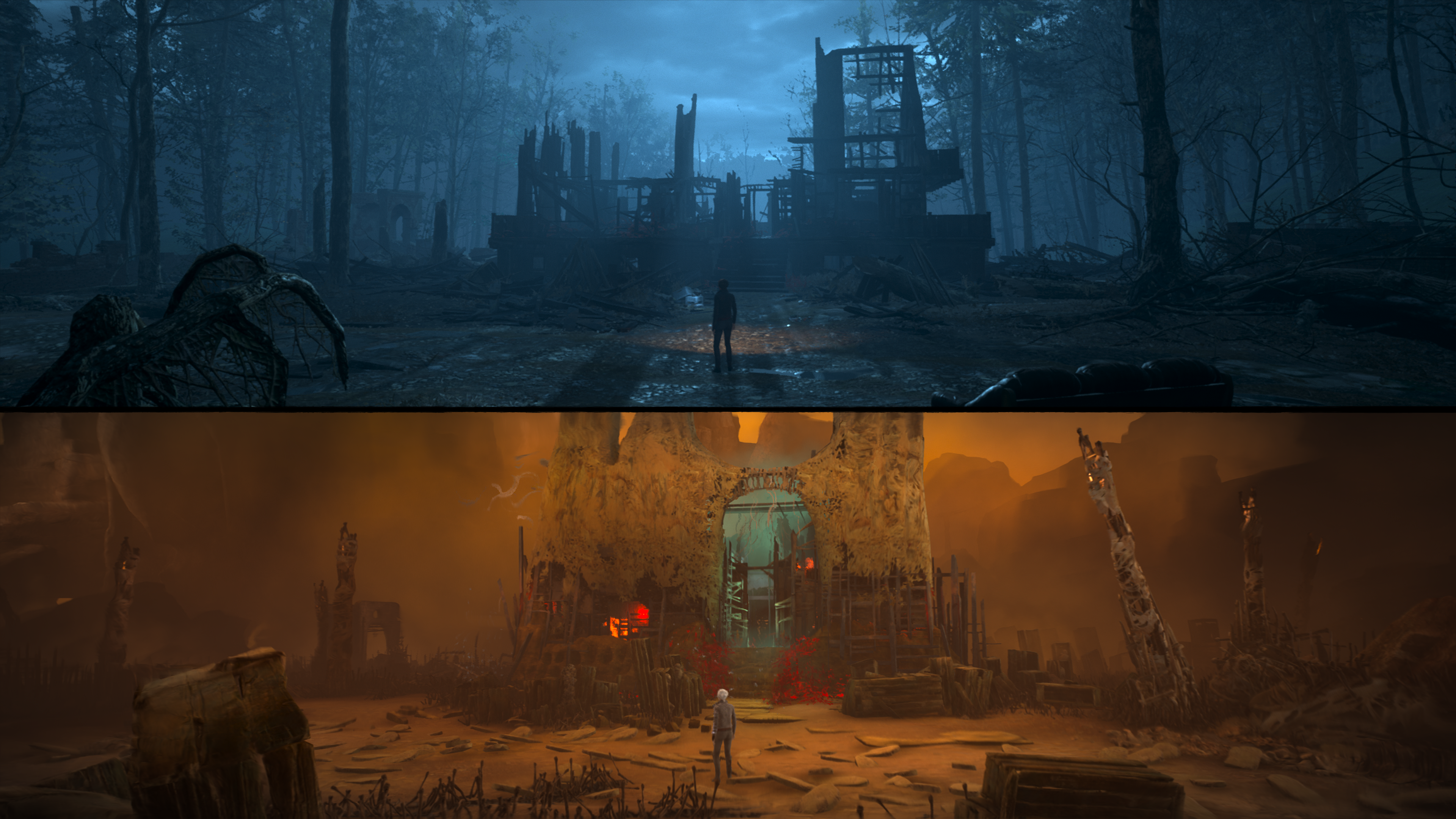Fungus blooms everywhere and doorways quiver, blanketed with a thick, terrible, alien skin. Later, arms will hang down from the ceilings and shattered bones will jut out of the ground. Later still, the entire world will be soaked in a blood-red filter as you scramble up mountains of paperwork and giant, haphazard filing cabinets.
Even the ‘real’ world is scattered with reminders of what used to be. A hotel is frozen in time, the scattered belongings of its guests - suitcases and odd shoes and forgotten toys - sprinkled throughout the ruins. It’s the kind of place that someone coined the word “hubbub” for, a room that’s supposed to ripple with laughter and footsteps and the endless ting of the bell on reception. For you, though, it’s empty. Cold. Dead.
Death is all Marianne has ever known. It begins with The Medium’s opening line - “It all starts with a dead girl” - and doesn’t waver right up until the credits roll. Even in this reality - her safe place, supposedly - she’s an undertaker, and that’s where we find her as her story begins, preparing to bury the only man that ever showed her any kindness.
The duality of The Medium isn’t subtle. It draws heavily on the ying-yang of contrast - good and bad; up and down; happiness and sadness - and recycles it endlessly, thematically and literally. There’s no attempt to conceal Bloober’s unabashed affection of old school horror, either. There have been flickers of it throughout the studio’s horror-heavy back catalogue, but no game has come quite as close to The Medium in terms of unadulterated adoration. That said, there’s a reason why some of those old horror tropes have been left in the past. The fixed camera angles undoubtedly enable the developer to spin a more sophisticated visual narrative, as well as heighten tension and uneasiness, but I am forever impaling Marianne on environmental hazards I simply can’t see. The tank controls, too, are better in theory than practice.
You no doubt already know that Troy Baker lends his talents to terrifying antagonist The Maw, and yes, he’s predictably wonderful as it - the creature’s guttural mutterings and furtive soliloquies hint at something vaguely human, or at least attempting to appear so - but otherwise, the voice performances are a little uneven. I can’t say I particularly warmed to Marianne, either; though fearless, her character was a tad too one-note for me. It was the story that kept me gripped, and while that too perhaps lacked the depth I’d been hoping for, it’s nonetheless an intriguing yarn that - like its title - was neither too long nor too short, but… well, medium length, at around eight-ish hours.
But oh my lord, is it beautiful here. I know it’s weird to say that - this netherworld is a burnt, broken place; it’s not somewhere you’d choose to holiday - but there’s an undeniable beauty here, too, secreted between the alien flora, fungi and fear. Juxtaposed just-so between the piles of skulls and frozen death masks, Bloober’s canny use of fixed vignettes means every shot is perfectly dreadful and dreadfully perfect, and only further enhanced by the soundscapes sculpted by composer Arkadiusz Reikowski and Silent Hill sound director and producer, Akira Yamaoka.
The inspiration drawn from celebrated Polish artist Zdzisław Beksiński (whose work I’ve now fallen wholly and inextricably in love with) is all over it, yes, but to Bloober’s credit, the world it’s painted is so much more than mere homage. As I progressed through Marianne’s story, the set-pieces reminded me of several games that have come before it - Alice: Madness Returns, Control, Silent Hill, and even Portal 2, to name but a few - and given every single one of them is celebrated for its striking visual vocabulary, that can’t be a bad thing.
And if there was a photo mode I’d have endlessly abused it. I suspect that’s weird to say, too, but it’s true. While it starts out muted - at first, Marianne’s alternate reality is painted with mud and rust - the further you progress, the more vibrant it’ll become, as though each time she returns to the real world, she leaves a fragment of herself behind to soften its palette and fill it with pale blues, mossy greens, and ruby reds.
The Medium isn’t quite as scary as prior Bloober offerings, though. Beyond one early, unexpected surprise (I still have bruised knees from where my legs collided with the underside of my desk), it’s a sedate affair, choosing to let its environments unsettle you rather than jumpscares. While I admit I missed some of Layer of Fears’ creative shocks, I can’t say this is to the game’s detriment, and may even win over new horror fans who crave atmosphere over scripted scares.
Moving through two realities simultaneously is every bit as disorientating as it sounds initially, but Bloober overcomes this with clever engineering that goes beyond merely projecting two versions of the same scene. More often than not, splitscreen cut-scenes portray slightly different perspectives, and what you’ll see in one isn’t always apparent in the other. This means you’ll find your gaze flicking from one side of the screen to the other - some splits are horizontal; others are vertical - in search of the irregularities, like a macabre spot-the-difference puzzle.
Talking of puzzles; cerebral they are not. I’ve been stuck on Bloober puzzles for hours in the past - Blair Witch stumped me good and proper several times - but The Medium’s offerings are less opaque, and only a couple outstay their welcome. Marianne has just three tricks up her psychic sleeve; Insight - the power to see beyond the veil and spy secrets an ordinary gaze will miss; Spirit Blast, which enables her to shoot out a powerful shock of energy to overload electrics or shake off enemies; and the ability to have an Out of Body Experience.
Yeah. I know. It sounds strange, and it is a bit. The former’s pretty cool, enabling her to get auditory visions of the past from everyday items, as well as construct Echoes, ghostly memories of the past that help Marianne piece together what once happened here. Spirit Blast, while ostentatious, is underutilised. Out of Body Experience, on the other hand, enables her to divorce her spirit from her physical form to access something - usually a lock - in the spirit realm.
She can also absorb and channel psychic energy by locating Spirit Wells - a font of psychic power, I guess you’d call it - that can also be used to ward off denizens as well as open doors. Your Out of Body Experience is always time-limited, though, as her spiritual side will slowly dissipate until you return her to her physical body. Dawdle too long, and she’ll die.
It’s perhaps no surprise, then, that given its so heavily constrained by the careful camera angles and tourniquet-tight storytelling, the gameplay is so rigid it might as well be on rails. Sadly, this results in an astonishing lack of organic exploration. Maybe it’s greedy to want more, but I do wish I could’ve spent more time scurrying around that topsy-turvy place, peeking into every creepy cranny and unmasking every secret.
Beyond this sedate puzzling, Marianne will find herself either skulking about or fleeing for her life. Again, the team has seemingly learned from mistakes such as Layer of Fear 2’s tedious scripted death sequences, and while there’s no doubt that making her run full-pelt towards the camera is both terrifying and a nod to horror games of yore, it gets old quickly. One breathlessly brilliant exception, however, sends you continuously catapulting between worlds as you run for your life, trying to avoid the hazards as you go.
Yes, Marianne’s world is one of duality - good and evil; heaven and hell; life and death - there is little negative to weigh down Bloober Team’s lofty ambition. Even though it substitutes scripted scares for an unsettling atmosphere instead - something I fear not all fans will be happy with - The Medium is the studio’s most successful, accessible offering yet, and a sign that Bloober continues to improve, mature, and innovate. I cannot wait for its next terrifying adventure.



